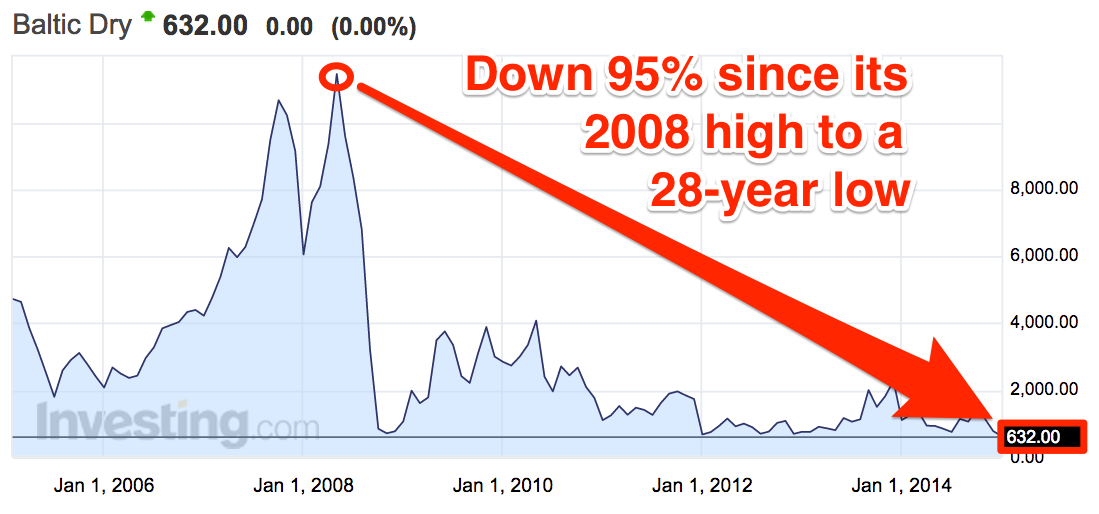Omen Baltic Dry Index Lowest in 29 Years
Post on: 16 Март, 2015 No Comment

The Baltic Dry Index (BDI), an obscure economic indicator that monitors the health of the worlds economy by tracking the price of shipping dry goods over oceans, has fallen to its lowest level in 29 years.
The index, compiled daily by London-based Baltic Exchange, is a daily number that tracks the prices shippers charge to send huge cargo ships of dry goods across oceans. It is believed to be an excellent gauge of the health of the world economy, although its accuracy has been called into question in recent years — in May 2008, for example, just before the recession, the Baltic Dry hit an all-time high of just under 11,800.
The accuracy of the BDI should not be questioned because of the 2008 recession. On the contrary, it makes perfect sense that the BDI wouldve been near all-time highs before the recession; thats how a bubble works. Everything seems hunky-dory and wonderful until the collapse. This is what we saw in the BDI. But I digress
On Monday, the index lost almost three per cent or 18 points to 590 points. Thats down by 60 per cent since the start of November, and now down to its lowest level since August 1986. Its not far off the all-time low set the month before that.
Thats a bad sign for the global economy, experts suggest, because reduced demand for raw materials suggests companies have less faith in their economic prospects.
The chart below shows the 5 year trend for the BDI:
Almost exactly 1 year ago, I discussed how we can examine the Baltic Dry to get a feel for the worldwide economy. Because large shipping vessels plan their voyages sometimes years in advance, the BDI (which measures this shipping activity) can offer a clue as to the strength and vigor of worldwide demand. A high BDI suggests strong demand, which can be identified with optimism toward the economy (which can be unfounded, as we saw in 2008). A low BDI suggests weak demand, which can be identified with pessimism toward the economy.
I have a specific reason why I find this low BDI to be significant: because we have supposedly been in an economic recovery since 2008. Turn on any mainstream media financial news, and the talking heads like Jim Kramer and Steve Liesman will ceaselessly babble on about how the USA has recovered, and is the only major economy worldwide to be facing significant growth in the near future. I say, nonsense. The recovery has been stagnant at-best. At-worst, American families are the worst off theyve been since 1990, which I recently discussed. The US economy has not recovered. On the contrary, the hole has been dug even deeper.
Here is my prediction: We are due for a massive recession, and soon. Like, next few years soon. Im not the only one who thinks so. Crispin Odey, a British hedge fund manager known for accurately predicting the 2008 crash, recently opined on this in a letter to investors :
A hedge fund manager who made millions after correctly predicting the credit crunch has warned major economies are entering a recession that will be ‘remembered in a hundred years’.
Citing the current turmoil in the markets, including a dramatic slump in the oil price and a ‘faltering Chinese economy’, he said: ‘This downcycle is likely to be remembered in a hundred years, when we hope it won’t be rated for ‘How good it looks for its age!’.
In his newsletter to clients he warned of problems further afield, with the slowing Chinese economy dragging down growth in Australia, South Africa and Brazil.
He said the fall in commodities such as oil, which has plunged from $115 a barrel in June last year to under $50, is ‘bringing with it pain to those heavily exposed’ – such as the Middle East, Venezuela, Argentina, mid-west USA, Canada, Norway and Scotland.
Closer to home, he warned the European Central Bank’s drastic efforts to revive the eurozone by printing £45billion a month through quantitative easing, would fail to prevent a damaging downturn.
He compared the combination of QE and negative interest rates to ‘pushing on a string’, and warned huge levels of debt to build up.
Keep your debt levels down and tighten your financial belt.














